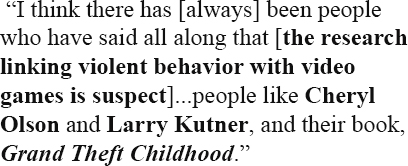Dr. Ceranoglu: As I said before, it’s the circumstances of that video game play, like, where, when, and how, and with whom? And, the “who” is playing will determine the effect of that video game on that person. So, there may be children who are more susceptible to have a problematic form of play.
BOOM: It seems that more critical attention is being paid to this subject, the relationship between violence in society and the playing of video games, at least amongst the medical research community. Do you agree with that and why or why not?
Dr. Ceranoglu: I think there has [always] been people who have said all along that [the research linking violent behavior with video games is suspect]. People like: Cheryl Olson and Larry Kutner, and their book, Grand Theft Childhood[2].
 They did, perhaps the only empirical study, where they went and talked to children, did focus groups with children, focus groups with parents. [They] actually surveyed the kids, their attitudes towards violence, their involvement in violence, and their video game habits. They surveyed over 1200 children, and in different communities as well, [making their study] more heterogeneous in that way, and more replicative of our general society. So there are people who have been saying it, but I think you are right, there are one’s from the younger generations that are now taking the reins in their hands and, together, we are questioning these things.
They did, perhaps the only empirical study, where they went and talked to children, did focus groups with children, focus groups with parents. [They] actually surveyed the kids, their attitudes towards violence, their involvement in violence, and their video game habits. They surveyed over 1200 children, and in different communities as well, [making their study] more heterogeneous in that way, and more replicative of our general society. So there are people who have been saying it, but I think you are right, there are one’s from the younger generations that are now taking the reins in their hands and, together, we are questioning these things.
BOOM: One of the most common accusations levied against all video games, not just the so-called, “violent,” ones, is that they are anti pro-social. Do you agree with that?
Dr. Ceranoglu: I think it’s taking it for face value. Take Grand Theft Auto, for instance, where you are playing as criminals all the time, it’s not a picture of pro-social behavior, but the children who play that game [research has shown] that they play it in a more normative way. [In other words,] they are playing bad guys but they are playing in a pro-social way. The play itself is a social activity when they are playing with one another. So, let’s not take it for the face value, but let’s look at what kids are really doing when they play these games.

BOOM: Last question Doctor.
Dr. Ceranoglu: Ok.
BOOM: Where do we go from here? Where should research dollars be spent as it relates to the study of video games and behavior?
Dr. Ceranoglu: I think we should continue looking at the circumstances of video game play, how are the attention and congnitive skills being affected. We should also look at how the parent’s are handling the video game decisions. Third, and perhaps most important, as we find out more, we should look at who is at risk: which child, is it a diagnostic group? Is it a child with an intellectual disability, or with developmental delays? Who is at risk and what is that risk?
BOOM: Thank you again Dr. Ceranoglu for taking the time to share your valuable and important point of view.
Dr. Ceranoglu: Thank you.
[1] Click here for more information on Dr. Kuhn’s research: http://journals.plos.org/plosone/article?id=10.1371/journal.pone.0091506)
[2] Click here for a link to this publication. https://books.google.com/books/about/Grand_Theft_Childhood.html?id=WWNKwlY96rEC
